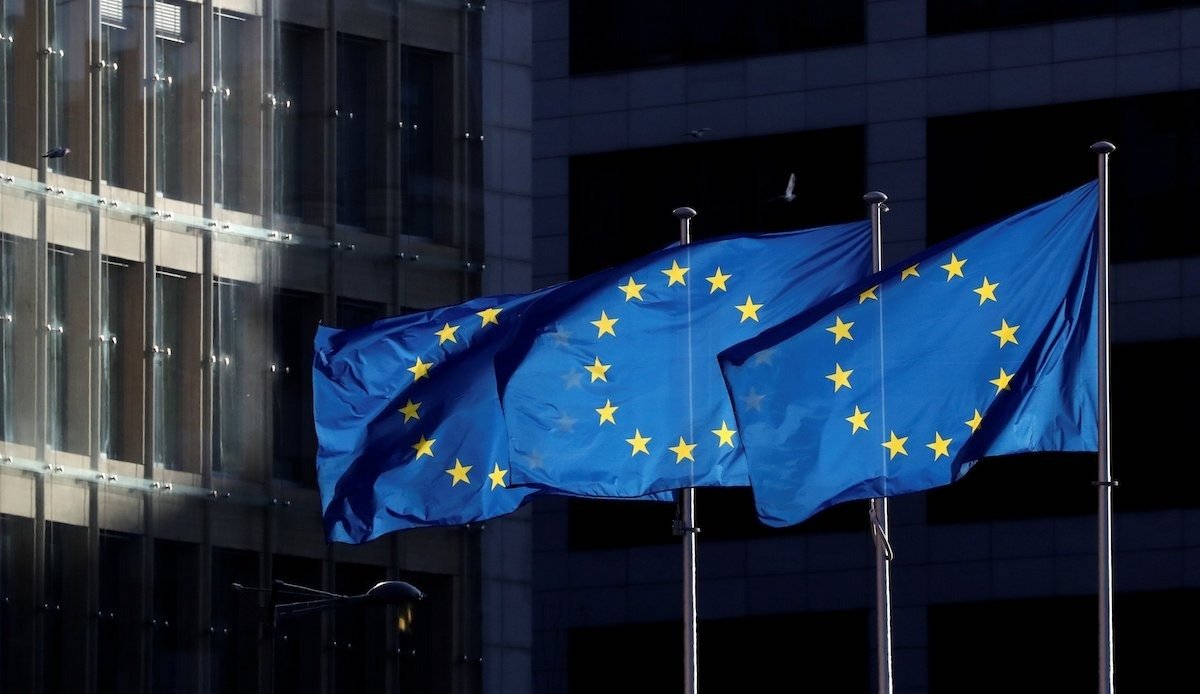Apple, Google, Facebook's AV1 standards group under antitrust investigation in EU
Antitrust regulators in the European Union are now investigating the wide-ranging big tech coalition that controls the AV1 video codec standard, citing concerns over anticompetitive behavior.

European Union flags
The Alliance for Open Media (AOM) was founded in 2015 to find a suitable video format that would adhere to W3C and HTML5 standards. It has co-developed the AV1 standard, an open video codec created as a royalty-free alternative to HEVC.
AV1 is seen as a better technical alternative to many video formats, as it offers better compression and, thus, uses less bandwidth and storage.
The 14 governing members of AOM include Google, Facebook, Intel, Microsoft, Netflix, Nvidia, Samsung, and many others including Apple, which joined in 2018. There are 41 general members including Adobe, AMD, Alibaba, the BBC, Hulu, VideoLan, Vimeo, and more.
Now, the European Union is investigating alleged anticompetitive behavior related to the license terms of AV1 by AOM and its members in Europe. The watchdog group has sent a questionnaire, seen by Reuters, to companies involved.
"The Commission has information that AOM and its members may be imposing licensing terms (mandatory royalty-free cross licensing) on innovators that were not a part of AOM at the time of the creation of the AV1 technical, but whose patents are deemed essential to (its) technical specifications," read the questionnaire.
The group cites concerns that AOM may be restricting innovators' ability to compete with AV1.The EU alleges that if true, it eliminates incentives for innovations.
The companies involved could be fined up to 10% of their global revenue for breaching EU rules. No timetable for the investigation has been announced.
Read on AppleInsider

European Union flags
The Alliance for Open Media (AOM) was founded in 2015 to find a suitable video format that would adhere to W3C and HTML5 standards. It has co-developed the AV1 standard, an open video codec created as a royalty-free alternative to HEVC.
AV1 is seen as a better technical alternative to many video formats, as it offers better compression and, thus, uses less bandwidth and storage.
The 14 governing members of AOM include Google, Facebook, Intel, Microsoft, Netflix, Nvidia, Samsung, and many others including Apple, which joined in 2018. There are 41 general members including Adobe, AMD, Alibaba, the BBC, Hulu, VideoLan, Vimeo, and more.
Now, the European Union is investigating alleged anticompetitive behavior related to the license terms of AV1 by AOM and its members in Europe. The watchdog group has sent a questionnaire, seen by Reuters, to companies involved.
"The Commission has information that AOM and its members may be imposing licensing terms (mandatory royalty-free cross licensing) on innovators that were not a part of AOM at the time of the creation of the AV1 technical, but whose patents are deemed essential to (its) technical specifications," read the questionnaire.
The group cites concerns that AOM may be restricting innovators' ability to compete with AV1.The EU alleges that if true, it eliminates incentives for innovations.
The companies involved could be fined up to 10% of their global revenue for breaching EU rules. No timetable for the investigation has been announced.
Read on AppleInsider

Comments
how about investing your time instead into innovation such that next time some EU companies play a co-leading role in developing standards?
you come across as the kid nobody wanted to play with and out of frustration start throwing sand at the others.
>The governing members of the Alliance for Open Media are Amazon, Apple, ARM, Cisco, Facebook, Google, Huawei, Intel, Microsoft, Mozilla, Netflix, Nvidia, Samsung Electronics and Tencent.<
About the closest you get to an EU country (as a member of AOM), is ARM. But the UK is no longer in the EU And ARM is now owned by SoftBank anyway, a Japanese holding company. The EU is the third largest economy in the World, they have only themselves to blame for falling so behind in tech.
Two articles from the past that are fun read now, if you're not from the EU. Written in 2010 and 2012, about how the EU lost their World dominance in the mobile telecommunication market, in just 3 years after Apple introduced the iPhone.
https://www.theguardian.com/business/2010/feb/14/mobile-world-congress-phones-networks
https://www.gsma.com/newsroom/press-release/mobile-economy-europe/
Another nice opinion piece about how the EU lost taking control of the internet to the US and they are still sore about that too.
https://thehill.com/opinion/technology/575023-whos-on-top-the-us-european-struggle-for-internet-leadership/
Just google ...... why EU lag in tech ...... and you will not find any shortage of articles explaining why. Like this one.
https://www.europeanceo.com/industry-outlook/behind-the-curve-why-europe-is-stuttering-in-the-global-tech-race/
The EU thinking is that if they can't profit by contributing to the tech industry, they can at least try to profit by taxing it to death. That's one thing they still good at.
https://mises.org/wire/europe-taxing-and-regulating-tech-now-its-lagging-behind-innovation
Will EU sue Intel and AMD because they are duopoly on PC desktop market?
Sounds like the obvious solution is to cancel one's membership. But why do that when you can convince the government to spend a bunch of taxpayers' money to force the group to do what you want?
Also the US through its spy agencies and other illegal means does a whole lot of corporate espionage on European companies. Also the EU is dominated by the US, it's a vassal, not a separate entity.
How much do we want to bet that one of those parties might be Germany's state-owned Fraunhofer. Or Sweden's Ericsson? All of whom are heavily invested in competing codec's H.266 success.
Fraunhofer and MPEG's mismanagement of HEVC is what killed adoption there and they'll do it again with H.266 if they can. The ߇갟纠putting pressure on AOM only serves to benefit Fraunhofer, MC-IF, and MPEG.
Even MPEG's past chairman said:
The EU needs to let the industry do industry things and prevent another broken licensing/patent fiasco like HEVC.